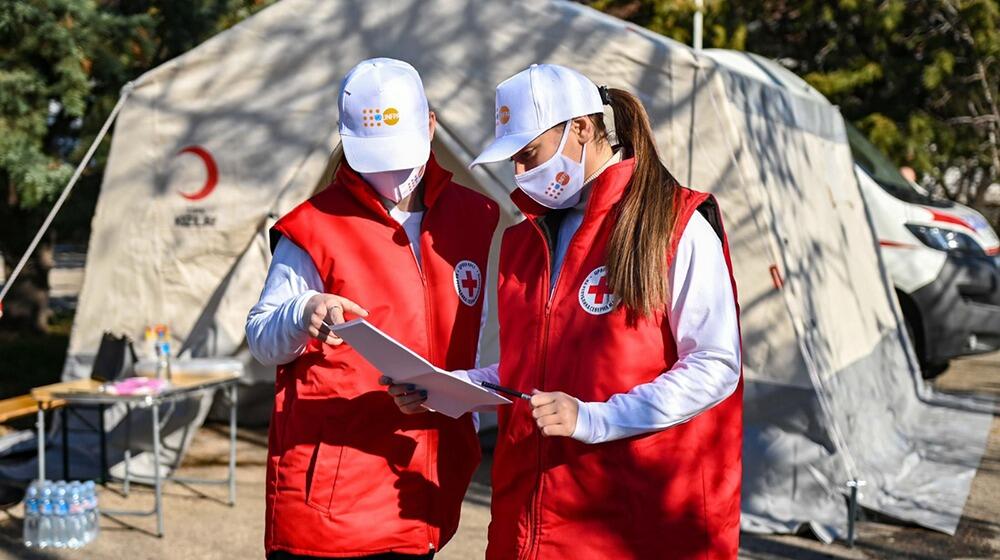“Ever since a routine check-up at the mobile gynaecological clinic, I’ve been living a second life”, said Svetlana Milić, a 65 year-old housewife from Češinovo-Obleševo, a municipality in the eastern part of North Macedonia.
Following her check-up, the doctor referred Ms. Milić for further examination where she was diagnosed with early-stage cervical cancer. She was soon operated on to prevent the cancer from spreading.
North Macedonia has 17 gynaecologists per 100,000 people. This is more than the European average, but they are unevenly spread across the country leaving half of the cities and villages without easily-accessible services for sexual and reproductive health. The time and money it takes to travel long distances to see a gynaecologist is a significant barrier, especially for vulnerable people and people in rural areas. As a result, many people do not have access to the services they need, including gynaecological check-ups and screening for cervical cancer. With the onset of COVID-19, access to these services has become even more difficult.
In response, UNFPA, in partnership with the Macedonian Medical Association - Association of Gynaecologists and Obstetricians, the Ministry of Health, the Safe Motherhood and Healthy Newborn Committee and the Red Cross, has developed a model to solve these problems.
Doctors and nurses travel with mobile clinics to perform free gynaecological examinations and other check-ups, including the early detection of cervical cancer, and provide referrals as needed. “These are mostly elderly women and the majority of them have never seen a gynaecologist before,” said Dr. Jasminka Ajtovska, a family doctor in Češinovo-Obleševo. “I explain to them why it is beneficial to make an appointment with the mobile clinic. We asked everyone individually whether they wanted to take one such examination for the sake of their health.”

Almost every case of cervical cancer is preventable. Well-organised screening programmes can reduce cervical cancer rates by up to 80 per cent or by up to 90 per cent if combined with HPV vaccination of adolescent girls.
Almost 200 doctors and nurses from the University Clinic for Gynaecology and Obstetrics and many Red Cross volunteers work in the two mobile clinics. More than 1,700 women in nine municipalities have been examined so far, many of them had not had a gynaecological check-up for many years. The project, implemented jointly with WHO and UNICEF, is financed by the COVID-19 Multi-Partner Trust Fund.
Staff in the mobile clinics also help identify suspected cases of domestic and gender-based violence and provide information on what local support services are available to survivors. Furthermore, they provide advice on how to choose a primary gynaecologist, and obtain health insurance.
Following the initial visits of the mobile clinics in December 2021, interest increased rapidly. This was spurred on by Dr. Ajtovska, the only general practitioner in this rural area, who made sure she called and encouraged her female patients to register for a check up.
The mobile clinics are integrated into the national health information management system, “Moj Termin”, which can refer patients to follow-up services. UNFPA and the Ministry of Health are working to develop a sustainable model for the mobile clinics, by integrating them into the national health budget.
“We have developed a model that brings quality reproductive health services closer to people,” said Afrodita Šalja-Plavjanska, Head of the UNFPA Office in North Macedonia. “This has already had a tremendous impact on the health and well-being of numerous vulnerable women, and by extension, their families and communities.”
Although the project ended in March 2022, UNFPA continues to support the mobile clinics as they are gradually incorporated into the national health budget to ensure women and girls, including the most vulnerable groups, including women in prisons, women drug users and sex workers are provided with these services.
Ms. Milić believes her first visit to the clinic saved her life. “I was 99 per cent certain that everything was OK because I had no symptoms and I felt no pain,” said Ms. Milić. “But Dr. Ajtovska insisted, and I decided to go. I’m very thankful.”



